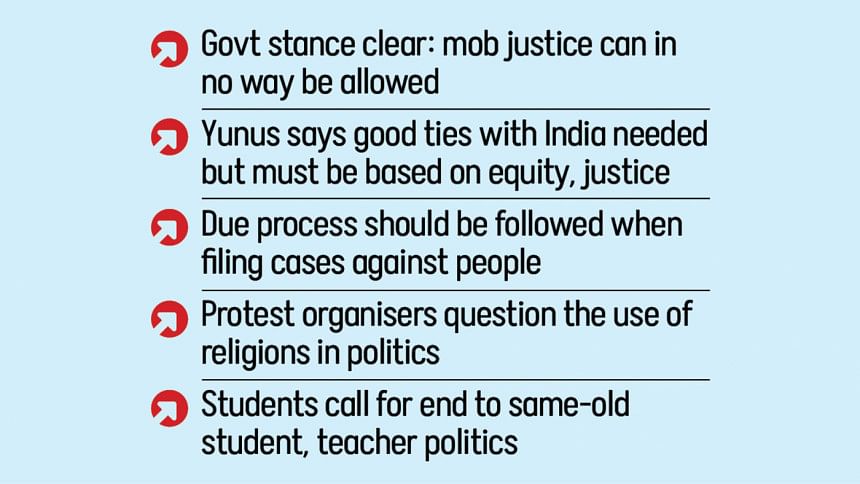Don’t stop till the job is done

Chief Adviser Prof Muhammad Yunus yesterday urged key organisers of the student-led mass uprising to continue their efforts to make students' and the people's dream of a new Bangladesh come true.
"For the dream, they sacrificed their lives. We must make that dream a reality. We have no other way," he said.

Not only are the people of the country eager to build a new nation, but Bangladeshis all over the world are also saying they want to be a part of realising that dream, he said at a views-exchange meeting with the students at the Chief Adviser's Office yesterday.
Yunus said when he sees graffiti on the walls, it surprises him. "How did the students come up with so many words? There were no poets, no writers, and no scholars behind them," he said.
Warning the students about possible attempts to sideline them from their nation-building work, he said, "Don't give up until the job that you have taken up is done."
Students have awakened a wave; they have also awakened the youth of the whole world. "The youth of other countries also say they want to learn about us because they need this in their country too," Yunus said.
He urged the students to write to him at least once a month so that the government does not go off course.
Bangladeshis did not get such an opportunity to rebuild the country since its birth. All should remain alert so that no one can take this away, he said, adding that if the opportunity was taken away, there would be no future for Bangladesh.
Nearly 150 students from various educational institutions who played key roles during the uprising were present at the event.
Briefing reporters at the Foreign Service Academy later on, Chief Adviser's Special Assistant Mahfuj Alam said issues related to Bangladesh-India relations came up in the discussion.
"Sir [Prof Yunus] repeatedly said that we need good relations with our neighbours, but it needs to be based on equity, honour, and justice."
MOB JUSTICE, VIOLENCE
During the views exchange, a student leader pointed out that stopping the incidents of mob justice is one of the main tasks of the interim government.
If mob justice spreads to different parts of the society, then a vested group can infiltrate and definitely try to destroy the students' unity, the leader said.
Mahfuj in the briefing said, "The government has a clear position regarding mob justice. It can in no way be allowed."
He said the law would take its own course when it comes to vigilante justice like attacks on mazars, temples or any person.
"People will not 'try' anyone who was part of the fascist government or the sycophants that surrounded it. Rather, they will remain alert so that there is no compromise [with the perpetrators] and no one betrays the martyrs and those who got injured," Mahfuj said.
He said that the government has already taken some stern actions and will take even stronger measures.
RELIGION IN POLITICS, CASES
Another student leader said religion has consistently been used as a political tool and this has to be stopped.
Mahfuj after the event said a student of BRAC University raised the issue of religions being used in politics.
He said there were no discussions regarding the matter as it involved the constitution and other institutions.
When a reporter asked about the large number of people being accused in cases, Mahfuj said that a due and standard process should be followed when a case is filed.
CAMPUS POLITICS
A woman student leader said a teacher or a student may have their own political ideology, but on campus they should only be a teacher or a student.
"We don't want to see any politically labelled teacher or student on campus," she said.
Mahfuj said many agreed in the meeting that the kind of student politics Chhatra League and Awami League practised should not return to campuses.
There is an ongoing debate and discussion at educational institutions about what kind of politics the students and teachers can be involved in on campus. The government will decide only after seeing a consensus reached through that debate, he said.
OTHER SUGGESTIONS
The student leaders recommended that the interim government take steps to control the price of essentials and ensure voting rights of the people by reforming the Election Commission.
They said the government should focus on increasing agricultural production by providing subsidies to farmers, lowering the costs of pesticides, diesel, and farm equipment.
They also expressed concerns over brain drain; border killings; and law and order.
A student leader appealed to Yunus to take steps so that those who go abroad for postgraduate and PhD degrees return home afterwards.
Another student called upon the interim government to allocate a greater portion of the GDP to the education sector.

 For all latest news, follow The Daily Star's Google News channel.
For all latest news, follow The Daily Star's Google News channel. 




Comments